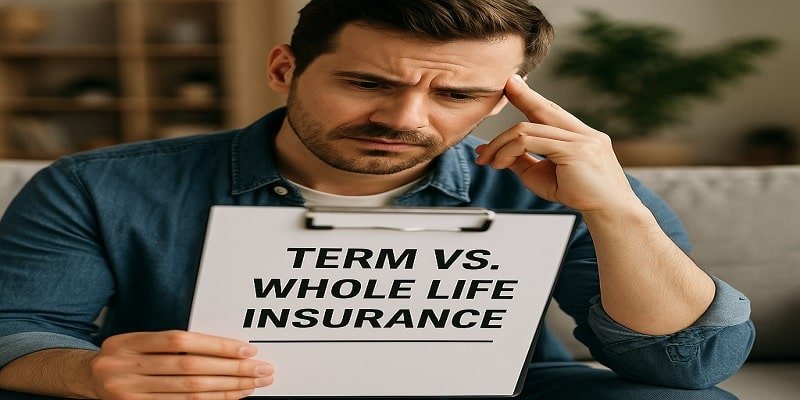“Term vs Whole Life Insurance”
Term vs Whole Life Insurance: Choosing the right life insurance can seem tricky, especially when you’re faced with terms like term life insurance and whole life insurance. Both offer financial protection, but they work very differently. Understanding these differences can help you make the best choice for your family’s needs.
In this guide, we’ll explain term vs. whole life insurance in simple and intuitive terms. We’ll also explain how each type works, what their advantages and disadvantages are, and who they’re best suited for. By the end, you’ll have a clear idea of which policy best suits your budget and long-term goals.
1. What is Term Life Insurance?
Term life insurance is the simplest and most affordable type of life insurance. It provides coverage for a set period of time (or “term”), typically 10, 20, or 30 years. If you pass away during that period, your beneficiaries receive a death benefit (a lump sum payment). If you outlive the policy term, it expires, and no payments are made.
Benefits of term life insurance:
✅ Low premiums – typically much cheaper than whole life insurance.
✅ Simple and straightforward – no complicated investment components.
✅ Flexible terms – you can choose a term that fits your needs (for example, until your children are grown or your mortgage is paid off).
Disadvantages of term life insurance:
❌ No cash value – unlike whole life insurance, it doesn’t grow savings.
❌ Temporary coverage – after the term ends, you may have to renew (often at a higher cost) or go without coverage.
Best for: Young families, people with a mortgage, or anyone who wants affordable, temporary coverage.
2. What is whole life insurance?
Whole life insurance is a type of permanent life insurance that covers you for your entire life, as long as you pay premiums. Unlike term life, it also includes a cash value component that grows over time.
How cash value works:
- A portion of your premiums goes into a savings account.
- The cash value grows tax-deferred (you don’t have to pay taxes on the gains until you make a withdrawal).
- You can borrow against it or even surrender the policy for cash.
Benefits of whole life insurance:
✅ Lifetime coverage – no expiration date.
✅ Cash value growth serves as an indispensable savings tool.
✅ Fixed premiums – your rate is always the same.
Benefits of whole life insurance:
❌ Expensive – premiums can be 5-10 times higher than term life.
❌ Complex – involves fees, and cash value growth can be slow.
Best for: People with higher incomes, those with lifelong dependents (such as children with special needs), or people who want an insurance policy that also serves as an investment.
3. Term vs. Whole Life Insurance: Key Differences
| Feature | Term Life Insurance | Whole Life Insurance |
|---|---|---|
| Duration | Temporary (10-30 yrs) | Lifetime |
| Cost | Affordable | Expensive |
| Cash Value | No | Yes |
| Flexibility | Simple, renewable | Complex, with investment aspect |
Which one should you choose?
- If you want low-cost, simple coverage → Term life insurance is probably the better option.
- If you want lifetime coverage + investment component, → Whole life insurance may be worth considering (if you can afford it).
4. Real-life scenarios: Who needs what?
Scenario 1: Young family on a tight budget
“Mark and Sarah just had a baby and bought a home. They need coverage in case something goes wrong, but their budget is tight.”
✅ Best choice: Term life insurance (e.g., a 20-year policy to cover their mortgage and child care).
Scenario 2: High-income individual with estate planning needs
“David, 45, makes $200,000/year and wants to leave a tax-free inheritance for his children.”
✅ Best choice: Whole life insurance (for lifetime coverage and cash value growth).
5. Common myths about life insurance
❌ Myth: “Whole life insurance is always a good investment.”
✅ Truth: Its returns are often lower than other investments (like stocks or mutual funds).
❌ Myth: “Term life is worthless because it expires.”
✅ Fact: It’s for temporary needs (like supplementing income during working years).
6. Final Thoughts: Term vs Whole Life Insurance
There is no one-size-fits-all answer to the term vs. whole life insurance debate. Your choice depends on:
✔ Your budget (can you afford the higher premiums of whole life insurance?).
✔ Your financial goals (do you need lifetime coverage or just temporary protection?).
✔ The needs of your dependents (do you have long-term obligations?).
For most people, term life insurance offers the best balance of affordability and protection. However, if you have complex financial needs, it may be worth talking to a financial advisor about whole life insurance.
7. Where to Find More Information
Still unsure? Consider talking to a licensed insurance agent to compare policies and find the best term life insurance or whole life insurance for your situation.
Do you need help estimating how much coverage you need? Leave a comment below!
FAQs on Term vs Whole Life Insurance
1. Which is Cheaper: Term or Whole Life Insurance?
Term life insurance is much cheaper—often 5-10 times cheaper than whole life insurance. Whole life insurance costs more because it lasts your whole life and includes a cash value component.
2. Does term life insurance expire?
Yes! Term life covers you for a set period of time (e.g., 10, 20, or 30 years). If you outlive this period, the policy expires unless you renew it (usually costs more).
3. Can I get money back from whole life insurance?
Yes! Whole life insurance builds cash value over time, which you can borrow against or withdraw. However, surrendering the policy early may reduce your death benefit amount.
4. Who needs whole life insurance?
Whole life insurance is best for people who:
- Want lifetime coverage
- Can afford higher premiums
- Need estate planning or a tax-free inheritance
5. Is term life insurance enough for most people?
For most people, yes! If you only need coverage until retirement or until debt/kids are grown, term life insurance is the easiest and most affordable option.
Still unsure? Compare quotes or talk to a financial advisor!
More Like This-


